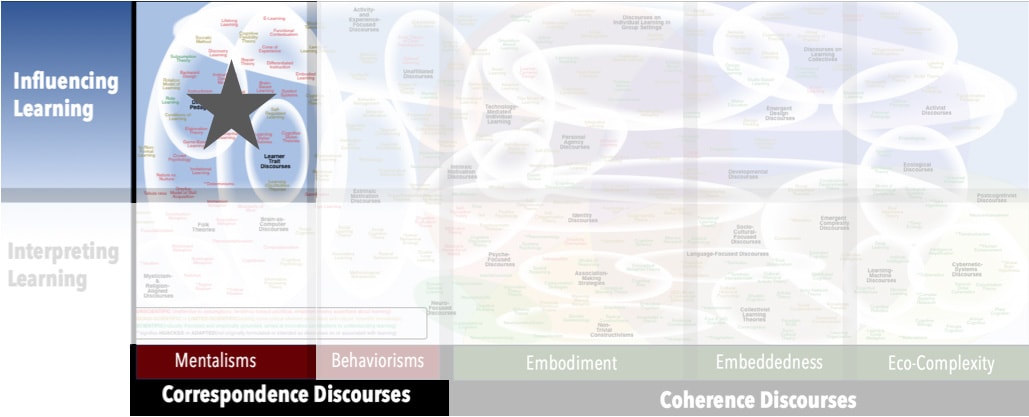AKA
Character Trait Discourses
Differential Psychology
Psychological Typologies
Focus
Interpreting learning and teaching in terms of the characteristics of the individual learnerPrincipal Metaphors
- Knowledge is … established, external truths
- Knowing is … measurable performance
- Learner is … an individual
- Learning is … acquiring; attaining
- Teaching is … instructing
Originated
1900sSynopsis
In popular terms, the word “learner” is overwhelmingly interpreted in terms of an individual person. Consequently, “learning” is understood in terms of changes to individual possibility against a backdrop of a steady personality, and that notion serves as a grounding assumption of Learner Trait Discourses. Concisely, if “learning” is narrowly defined in terms of what a “learner” does, it follows that the characteristics of the learner will define the learning that happens – where “characteristics” are defined as the steady or enduring aspects of one’s personality. Phrased quite differently, Learner Trait Discourses typically assume a Cartesian Subject and are focused on naming the fixed qualities of that subject:- Cartesian Subject (Modern Subject) – a conception of the human knower as an incorporeal entity that is entrapped in a physical body – insulated from the real world, isolated from one another. The notion of a Cartesian Subject is generally associated with a cascade of dichotomies, including mental/physical, mind/body, thought/action, internal/external, individual/collective, self/other, knower/knowledge, subjective/ objective, observer/observed, and fact/fiction. (Compare: Postmodern Subject, in Identity Discourses.)
- L Data (Life Data) – information about an individual’s personal history
- O Data (Other Data) – information about an individual gathered from others (e.g., family, friends, and third-party evaluations)
- Q Data (Questionnaire Data; S Data; Self Data) – information about an individual gleaned from both observations and evaluations conducted by others and subjective self-reporting
- T Data (Test Data) – information about an individual gleaned from formal tests and scientific measures
- Dimensional Theory of Emotion – the perspective that emotions can be decomposed into fundamental dimensions. Among these perspectives, there are considerable differences around what these dimensions might be, but there is broad agreement on two of them: pleasantness–unpleasantness and arousal–relaxation.
- Ipsative Assessment (Forced-Choice Scale) – derived from Latin ipse “of the self,” a type of question (or questionnaire) that compels respondents to indicate their preference of two fixed choices. The strategy is especially popular among Learning Styles Theories, Cognitive Styles Theories, and Personality Types Theories.
- Learner Characteristics (Learner Model; Learner Profile) – a concept deployed in some branches of education and Psychology, associated with identifying categories of learners (according to personal, academic, and/or demographic qualities), typically to define and form target groups for experimental teaching methods and instructional materials
- Applied Psychology (Hugo Münsterberg, 1910s) – an umbrella notion, applied to pragmatically oriented branches of Psychology, including:
- Child Psychology – a branch of Psychology focused on the study and treatment of behavioral, mental, and emotional issues of individuals from birth through adolescence
- Clinical Psychology – a professional domain that focuses on assessing, diagnosing, monitoring, treating, studying, and preventing emotional and behavioral disorders (see Medical Model of (Dis)Ability)
- Counseling Psychology – Typically drawing on Well-Being Discourses and Personal Agency Discourses, Counseling Psychology aims to support schooling success and career development by focusing on individuals’ senses of self, social relationships, and overall functioning.
- Educational Psychology – Dominated by Positivism and related sensibilities, Educational Psychology is mainly focused on studying and assessing learning in formal educational settings, with a secondary interest in the psychology of teaching.
- School Neuropsychology – A more recent specialty of School Psychology that focuses on aligns strongly with Cognitivism and Information Processing Theory in its emphasis on evaluating cognitive processing through standardized instruments
- School Psychology – Most prominently drawing on Personality Types Theories, Identity Discourses, Developmental Discourses, Motivation Theories, and Learner Trait Discourses, School Psychology is a field that focuses on the diagnosis and treatment of individuals’ behavioral and learning problems.
Commentary
Learner Trait Discourses tend to cast the individual learner as an isolated and insulated entity whose learning is determined by largely immutable qualities. These discourses have been used to differentiate among and segregate learners, to rationalize regimes of measurement and comparison, to explain away differences in achievement and aptitude, and to further entrench structures and emphases of traditional (standardized) education. Critical attentiveness to underlying assumptions on learning and learners is rarely part of the discourses.Subdiscourses:
- Applied Psychology
- Cartesian Subject (Modern Subject)
- Child Psychology
- Clinical Psychology
- Counseling Psychology
- Dimensional Theory of Emotion
- Educational Psychology
- Ipsative Assessment (Forced-Choice Scale)
- L Data (Life Data)
- Learner Characteristics (Learner Model; Learner Profile)
- O Data (Other Data)
- Q Data (Questionnaire Data; S Data; Self Data)
- School Neuropsychology
- School Psychology
- T Data (Test Data)
Map Location

Please cite this article as:
Davis, B., & Francis, K. (2024). “Learner Trait Discourses” in Discourses on Learning in Education. https://learningdiscourses.com.
⇦ Back to Map
⇦ Back to List
